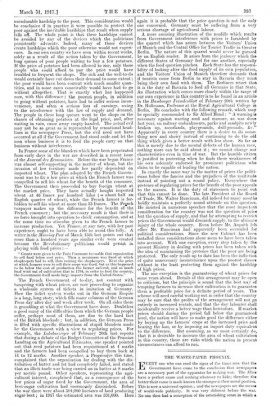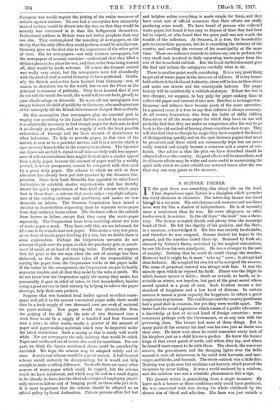THE WASTE-PAPER PHOENIX.
EVERY one who can read the signs of the times sees that the Government have come to the conclusion that newspaper. are a necessary part of the apparatus for making war. The Allies have a perfect cause and nothing whatever to hide; therefore the better their cause is made known the stronger is their moral position. This is now a universal opinion ; and the newspapers arc the means of world-wide publicity. It was very different before the war. No one then had a conception of the astonishing sense in which a
European war would require the pitting of the entire resources of nations against nations. No one had a conception how intimately neutral nations would be drawn into the war, so that they would be scarcely less concerned in it than the belligerents themselves. Professional soldiers in Britain were not better prophets than any one else. They contemplated the muzzling of newspapers, on the theory that the only office they could perform would be mischievous.
Germany gave us the first clue to the importance of the other point of view. She let newspapers—not only German newspapers, but the newspapers of neutral countries—understand that they filled a distinct place in her plans for war, and that, so far from being warned off, they would be made welcome. Of course the German control was really very strict, but the newspapers were fed abundantly with the kind of stuff it suited Germany to have published. Gradu- ally the British authorities have learned from Germany—not, of course, to distribute lies to the world, but to use the Press as the principal instrument of publicity. They have learned that if you do not tell the world the truth, the world will invent facts, greatly to your disadvantage or discredit. To warn off our newspapers was simply to leave the field of publicity to Germany, who made great use of her monopoly till the British Government changed their methods.
On this assumption that newspapers play an essential part in waging war according to the latest fashion reached by civilization, it is admittedly necessary to find enough paper for their use, to find it as cheaply as possible, and to supply it with the least possible exhaustion of tonnage and the least amount of disturbance to other industries. To help to provide paper, in this view of the matter, is seen to be a patriotic service, and it is a service which is open to every householder in the country to perform. The Spectator can throw out an S.O.S. signal to all who can help with less appear- ance of self-interestedness than might be read into a similar appeal from a daily paper, because the amount of paper used by a weekly journal, however prosperous, cannot be compared with that used by a great daily paper. Tho scheme to which we wish to draw attention has already been put into practice by the Swansea Cor- poration. Since then Lord Rhondda has appealed to other Local Authorities to establish similar organizations, and has thereby shown his quick appreciation of that kind of scheme which pays best in these days—a scheme that needs only a very slight adapta- tion of the existing customs and machinery, and makes no new demands on labour. The Swansea Corporation have issued a circular to householders requesting them to separate waste-paper from their ordinary house refuse. The dustmen collect the rubbish from houses as before, except that they carry the waste-paper separately. The Corporation have been receiving about ten tons of waste-paper a week. They have sold this, we are informed, for £2 a ton to be remade into new paper. This seems a very low price, as we hear of waste-paper fetching £8 a ton, but no doubt there is some explanation. Perhaps the Corporation servants do not attempt to pick over the paper, so that the purchaser gots an assort- ment of small, or at least of varying, value. Further, we suppose that the price is the net sum when the cost of carriage has been deducted, or that the purchaser takes all the responsibility of carting the paper from the Corporation works to the paper mills. If the latter be the arrangement, the Corporation are put to hardly any extra trouble, and all that they make by the sales is profit. We do not know how the Corporation apply the money they make, but presumably it goes in relief of rates, so that householders, besides doing a good service to their country by helping to relieve the paper shortage, help their own pockets.
Suppose that two hundred local bodies agreed to collect waste- paper and sell it to the nearest convenient paper mills, there would then be a fresh supply of two thousand tons per week of material for paper-making. New paper would rise phoenix-like from the pulping of the old. At the rate of two thousand tons a week there would be a supply of a hundred and four thousand tons a year ; in other words, nearly a quarter of the amount of paper and paper-making materials which may be imported under the latest restrictions. Such a saving as this is surely well worth while. Nor are newspapers the only industry that would be aided. Paper and cardboard are of course also used for munitions. For our part, we think the figures mentioned above could be considerably exceeded. We hope the scheme may be adopted widely and at once. A universal scheme would be a great success. A half-hearted scheme would certainly be disappointing, for it would not help enough to make a telling difference. No doubt there are many other sources of waste-paper which could bo tapped, but the scheme which we have mentioned, and which may be said in a small degree to be already in force, has the ideal advantages of employing practi- cally no extra labour and of bringing profit to those who join in it. It is most important that the scheme should be adopted as an official policy by Local Authorities. Private persons often feel lost
and helpless unless everything is made simple for them, and they have some sort of official assurance that their efforts are really producing some result. We have heard of persons who collected waste-paper, but found it less easy to dispose of than they had been led to expect, or who found that tho price paid was not worth the trouble of the collection. At Swansea, it is true, the householder gets no immediate payment, but he is smoothing the industry of the country and swelling the revenue of his municipality at the same time. Those are sufficient rewards to induce any one to perform the very small task involved in daily separating waste-paper from the rest of the household rubbish. But the Local Authorities must give the lead 'and inform the ratepayers carefully what to do.
There is another point worth considering. It is a very good thing to get rid of waste-paper in the interests of tidiness. If every house- hold collects it for the Local Authority, there will be less to blow about and make our streets and the countryside hideous. The paper factory will be incidentally a rubbish-destroyer. Before the war it was cheaper, we suppose, to buy pulp for paper-making than to collect old paper and convert it into new. But that is no longer trite. Economy and tidiness have become parts of the same operation. In a general sense it is true to say that tidiness is always economy. At all events, housewives who form the habit of tidily ridding themselves of all the waste-paper for which they have no use will probably find that they are under no temptation after the war to go back to the old method of leaving about countless dust-traps. They will also find that as though by magic they have acquired the knack of distinguishing quickly and on the spot between papers that must be preserved, and those which are customarily kept but are never really wanted and simply become a nuisance and a source of con- fusion. Our advice is that the plan we have described should be adopted all over the country. Its good effects will be immediate, and its ultimate effects may be wider and more useful in maintaining the spirit with which we must rebuild our national house after the war than any one may guess at the moment.



























 Previous page
Previous page